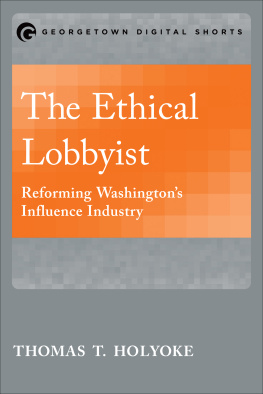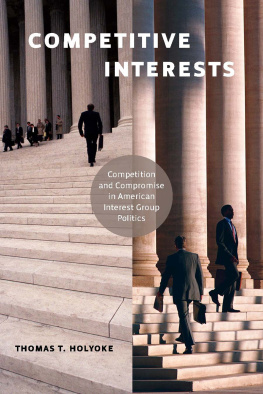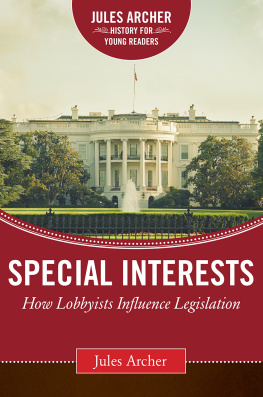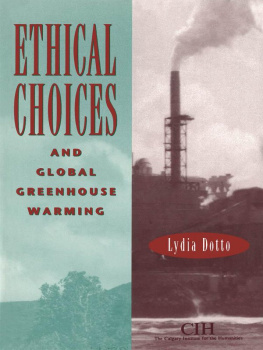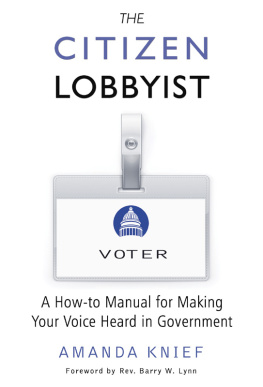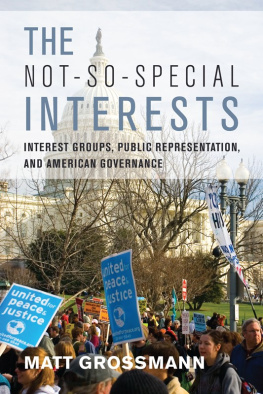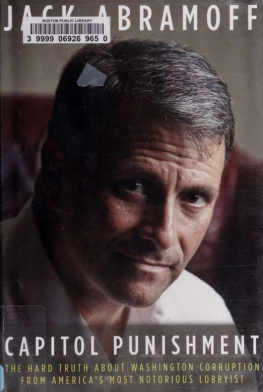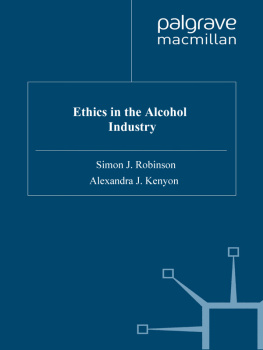Acknowledgments
THIS PROJECT STARTED as a whim one day when I was thinking about some of the implications of the arguments I made about how lobbying works in my books Competitive Interests: Competition and Compromise in American Interest Group Politics and Interest Groups and Lobbying: Pursuing Politics Interests in America. Rather than do just another value-free study of interest group lobbying, I decided to write something that connected my work to the real world of lobbying and, hopefully, has some real relevance to that world and the people who work in it. Because normative work like this often cannot find a home in academic journals, I am very grateful to the staff members of Georgetown University Press for their willingness to take a chance on the project through their Digital Shorts series. I would like to thank the Office of the Provost and the Henry Madden Library at California State University, Fresno, for sponsoring parts of the research leading to this work. I would also like to thank my former department chair, David Schecter, for giving me the Rolling Stone article that got the whole manuscript going!
Introduction
IN 2013 ROLLING STONE magazine published an expos of one of Americas most powerful interest groups, the National Rifle Association (NRA). A gruesome school shooting claiming the lives of students and teachers had failed to shake the NRAs opposition to legislation proposed by President Barack Obama restricting a persons ability to purchase any type of gun, or even track gun ownership. But because restrictions on firearm purchases and background checks threatened the gun manufacturers dominating the NRAs board of directors, the author argued that Wayne LaPierre, the organizations executive vice president, had little choice but to take a hard-line position. The presidents gun control legislation sank in the Senate as a result. The author questioned LaPierres ethics for choosing to oppose legislation supported by a majority of his own members, as well as a majority of Americans. But was his choice unethical?
This is an important question to think about. Interest groups and lobbying firms are, after all, Washingtons growth industry. By one, arguably conservative, count, there are almost 7,000 organized interest groups and more than 19,000 lobbyists working in and around the capital city today.
Although large, world-spanning behemoth corporations invest more money and effort on lobbying than anybody else, political advocacy by corporate interests and cause-oriented public interest groups exists across the board. What could be more unethical than that?
But what does it even mean to talk about ethical lobbying? What purpose would ethics serve? Is there an ethical standard? Would lobbyists themselves know when they are acting ethically? For all the concern expressed about corrupt lobbyists, there have been very few attempts to define what good or desirable, and thus presumably ethical, lobbying might be like. The political theorist Jane Mansbridge once argued that lobbying can be legitimate in a pluralist system because so many interests, both big and small, need representation, but legitimacy requires lobbyists to first get the people they represent to talk with each other and figure out just what their interests really are. Once constituent interests are defined and refined through deliberation, she argued, lobbyists can go about the business of pressuring political leaders to meet the demands of these interests. Whether dialogue among constituents makes lobbying ethical is not clear; nor is it clear that lobbyists can be compelled to engage constituents in it.
I argue that Mansbridge is essentially right; but defining lobbying ethics means that we must figure out what makes lobbying legitimate in the first place, and also what drives some lobbyists to act illegitimately. It is the Constitutions First Amendment that gives lobbying a role in the representative democracy of the United States. It protects lobbying as a legitimate form of political representation, but only as long as lobbyists faithfully represent the wants and concerns of the people employing them. Ethics protect a professions legitimacy, and in this case the ethical problem is that lobbyists might misrepresent the interests of the people employing them because the power relationship between them is so unequal. Because lobbyists know more about what is happening in the political system, and their own role in it, than the people they represent, lobbyists have the power to manipulate the interests of their constituents. Ethical lobbyists must put aside any personal or professional pressures that might tempt them to take advantage of this information asymmetry. They must honestly, even myopically, represent only the interests of the peoplewhether clients or interest group memberswho employ them, once these interests have been determined and refined.
Can any legal framework guarantee that lobbyists will behave ethically? Of course not. Nobody can be forced to be ethical when they are determined to behave badly. But in many professions, as with lawyers and medical doctors, laws reinforce the ethical standards set by the profession itself by requiring the disclosure of certain kinds of information. Can ethical standards be defined for the lobbying profession that are reinforced by the mandatory disclosure of information? I believe so, as long as they are based on three crucial principles of representation: transparency, accountability, and consensus. Current lobbying disclosure laws, unfortunately, fail to do this. New laws are needed, and needed quickly, because it takes time for disclosed information to become regularly relied on by a professions practitioners and enforcers, just as it takes time for ethical norms to take root. Otherwise, the growing ferocity of competition to influence policy, and the temptation to make enormous amounts of money while doing it, at the expense of constituent interests will overwhelm any effort to build a system of professional ethics.
To reinforce this sense of urgency, I start, in I sketch a framework for lobbying ethics, and a proposal for reforming the lobbying disclosure laws based on this framework.

